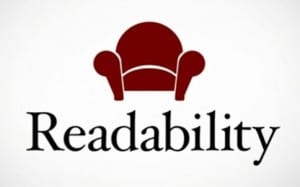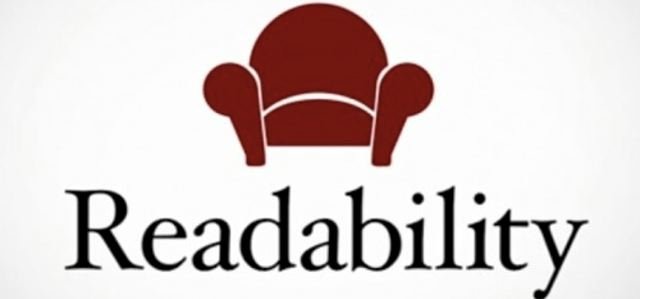Readability Abandons Publisher Payment Program
 Earlier today, Rich Ziade, a founding partner and CEO of Readability, made an announcement that his company was ending its reader fees program and would be no longer offering payments to participating publishers.
Earlier today, Rich Ziade, a founding partner and CEO of Readability, made an announcement that his company was ending its reader fees program and would be no longer offering payments to participating publishers.
Readability is a service that aims to make Web pages more easily read. Working through either browser extensions, bookmarklets or mobile apps, Readability strips out “unnecessary” parts of a Web page and presents the test and images of an article with clear typography and colors.
However, since Readability also strips out any ads that the site might have, possibly hurting sites that depend on advertising income, Readability set up a plan with which it would share some of its subscriber revenue with publishers who signed up.
It is that system that is now coming to an end.
According to Ziade, though thousands of Readability users participated, only some 2,000 domains out of millions signed up to receive money. As a result, the company has some $150,000 in an account not doing anything. Readability will be doling out checks for owed money to publishers, including those who sign up between now and June 30 (regardless of amount owed), and will donate what’s left to two charities focused on writing and reading-related issues.
However, this doesn’t seem to have done much to settle the issue and, if anything, the cancellation has just re-ignited a heated debate about Readablity.
A Controversial Product
Among publishers and authors, Readability has been controversial almost since day one.
Not only has the service been accused of sabotaging writer’s ability to make a living from advertising, but many questioned the ethics of the business model, saying that the collecting of revenue on behalf of publishers without notifying them or getting their permission was unethical.
One particularly staunch critic of Readability is Web developer Joel Housman who, in a blog post, said:
I never consented for Readability to collect fees on my behalf. Readability is finally admitting that 90% of the publishers their users read, never signed up for their opt-in service despite the fact that, for years, they used this justification to collect money from users on their behalf. Sleaze.
Others were more willing to defend Readability but felt that the money should go to the content creators and maligned Readability for not doing more to reach out to those who had not registered.
As Chuck, a commenter to the original post, put it:
The money should be given to the writers who signed up. Those who didn’t should contacted by the Readability team. You can’t just claim money on behalf of someone without consent or even knowledge, but worse is giving that money, according the you their money, to someone else.
Many users even demanded refunds saying that they either didn’t support the charities chosen or didn’t feel the charities represented their goals.
Still, some did defend Readability, including Jeffrey Zeldman, who, in a comment to the original announcement posted prior to a radio interview with Ziade, said:
I salute my friends at Readability for giving a damn about writers, readers, and content and for at least trying to think of a sustainable solution to the problem of who pays for content.
In the end, most of the feedback was roundly negative with heavy criticisms from both authors and readers who wanted their money to go to content creators.
My Personal Take
I have a tendency to use Plagiarism Today as a guinea pig for new ideas and business models. As such, I signed up for the publisher program at Readability, making this one of the 2,000 domains that did register, to see how much I would earn and what would happen with my content.
It appears that I will be getting a check… For $0.92.
![]()
This is after almost a year of participation. Simply put, not a lot of people have used Readability on my site, partly because I don’t have a lot of distracting material and I try to use good typography from the start, but also because not a large percentage of my audience uses it to start with.
In the end, it wasn’t even worth the few minutes of my time to sign up, let alone the other risks I took.
While Readability is right that not enough domains signed up to make the system practical, it isn’t just publishers that are too segmented and numerous. There are also other reader programs, like Evernote Clearly and other systems for trying to reward content creators, such as Flattr. There’s no way that a content creator, especially a smaller one, can justify participating in every single one.
Still, if this is the business model of the future, then I’m very glad I have my main job to fall back on.
Bottom Line
Readability’s efforts failed but I don’t think it was a lack of participation by publishers that killed it. With millions of sites being put into the system and only $150,000 to spread between them, what motivation is there for most of those sites to sign up?
If we assume that just 2 million sites are involved, each site would have earned an average of about 8 cents. That makes my 92 cents sound a lot better. The publishers didn’t participate because they didn’t know about it and they didn’t know about it because the money was never there.
The business model was flawed from multiple directions, not just publisher participation (this is especially true as Readability had a rule that required earning $50 to get a check). However, it feels to me and others that Readability is trying to blame publishers for not coming to the table when, at the end of the day, they didn’t have much to put on the table in the first place.
While $150,000 is a lot of money, it’s very little when you have to divide it so many ways.
In the end, this won’t do anything to alleviate the tension between Readability and publishers, if anything, it’s going to make the situation much worse.
Want to Reuse or Republish this Content?
If you want to feature this article in your site, classroom or elsewhere, just let us know! We usually grant permission within 24 hours.
